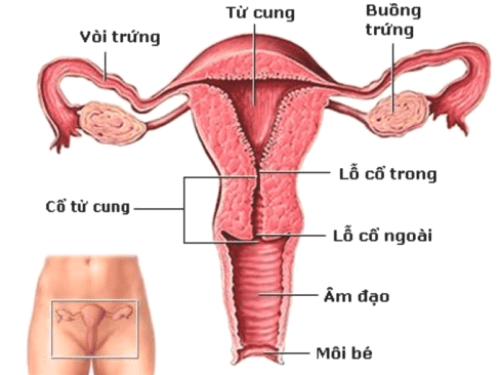1. What is a short menstrual cycle?
Menstruation is the process where the uterine lining sheds, moves through the cervix, and exits the body through the vagina each month. Understanding the characteristics of a normal cycle will help women determine if they are experiencing a short menstrual cycle.
Understanding the characteristics of a normal cycle will help women identify if they are having a short menstrual cycle.
A woman's menstrual cycle typically lasts between 21 and 35 days, with the bleeding phase lasting from 2 to 7 days. However, it’s important to note that the menstrual cycle can change over time due to various factors. For instance, during pregnancy, women will not have menstruation because the uterine lining does not shed but instead develops to nourish the fetus.
However, if a woman's cycle was previously several days long and has suddenly shortened, it could be a sign of some issues that require monitoring.
Each woman's menstrual cycle is different - the onset of menstruation may be earlier, later, or exactly as expected compared to usual.
On the other hand, having less menstrual bleeding than usual is generally not a concern. A woman’s menstrual flow can vary from month to month, and some months may have lighter bleeding than others. Lighter menstrual flow can be a sign of pregnancy or hormonal issues. Additionally, people might confuse menstrual bleeding with spotting or discharge mixed with blood.

2. Symptoms of a short menstrual cycle with light flow
On average, a woman loses about 50-80 ml of blood during each menstrual cycle. However, the actual amount of menstrual blood can vary significantly from person to person. Women should be especially mindful if they notice that their flow is lighter than usual. A simple way to measure the amount of menstrual blood a woman loses each month is by using a menstrual cup.
Common symptoms women experience when their menstrual cycle is short and their flow is light include:
- Shorter duration of menstruation compared to a normal cycle.
- Less blood flow, with fewer pad changes needed.
- Light flow for the first 1-2 days, then it becomes lighter and more regular.
- Spotting for several days instead of continuous bleeding.
A short menstrual cycle may reduce some symptoms of premenstrual syndrome (PMS), including back pain, uterine cramps, and mood changes. Although sometimes women may experience an abnormal menstrual cycle with no clear cause, it is still necessary to see a doctor.
3. Causes of Short Menstrual Cycles and Light Flow
Several factors may cause a woman to experience a shorter menstrual cycle and lighter menstrual flow than usual:
3.1. Age
A woman's menstrual cycle can change at different stages of life. The first period in girls is typically short, with light flow and irregularity. Over time, the cycle becomes more stable and regular as women enter their 20s and 30s.
By the late 30s and 40s, the menstrual cycle may shorten, and there may be months without periods, or menstruation may occur later than usual. As women approach perimenopause, menstrual flow typically decreases, and the cycle becomes more irregular.
3.2. Anovulation (No Ovulation)
Some women may experience irregular periods due to anovulation, which means their body does not release an egg during the menstrual cycle. This can lead to shorter, irregular cycles or light bleeding.
3.3 Underweight
In women who are underweight, menstruation may become lighter or even stop altogether. This is because very low body fat levels prevent regular ovulation, leading to menstrual irregularities.

3.4. Overexertion or Intense Exercise
High-intensity exercise can affect a woman's menstrual cycle, especially in athletes. Due to stress, low body weight, and energy deficiency, they may experience changes in their cycle, such as a shorter menstrual cycle or even temporary amenorrhea (lack of periods).
3.5. Pregnancy
During pregnancy, menstruation stops completely. However, in some cases, light bleeding can occur due to implantation bleeding when the fertilized egg attaches to the uterine lining. This is an early sign of pregnancy, usually lasting up to two days. Implantation bleeding typically occurs around 10 to 14 days after conception, but not all pregnant women experience this. The occurrence of implantation bleeding is seen in only 15 to 25% of pregnancies.
If a woman has regular sexual intercourse and misses her period, she should consider taking a pregnancy test.
3.6. Miscarriage
Miscarriage can cause vaginal bleeding, which may be confused with menstruation. Many women, especially in the early stages of pregnancy, may not realize they are pregnant, and thus the cause of the miscarriage may be unclear.
The amount of bleeding during a miscarriage can vary, and the duration can differ depending on how far along the pregnancy was.
3.7. Breastfeeding
When a woman is breastfeeding, menstruation may be delayed. The hormone responsible for milk production delays ovulation, which in turn postpones the return of menstruation. Therefore, a woman may not have her period for several months after childbirth.
Although breastfeeding delays menstruation after childbirth, pregnancy is still possible even if the woman hasn't had her period yet. This is because ovulation can occur as early as two weeks before the first post-birth period. If a woman has unprotected sex during this period and experiences bleeding, taking a pregnancy test is necessary to rule out implantation bleeding.
3.8. Stress
Stress can affect hormonal balance in the body, leading to menstrual cycle irregularities. Common symptoms include a shorter cycle or temporary amenorrhea. However, there's no need to worry, as once stress is relieved, the cycle typically returns to normal.
3.9. Contraception
Using birth control pills can lead to shorter menstrual cycles with lighter flow. This is because birth control pills contain low levels of hormones and do not stimulate the uterus to build up a thick endometrial lining, resulting in less shedding during menstruation.
Women using hormonal contraceptive methods such as intrauterine devices (IUDs), implants, or injections may also experience light periods or spotting between cycles due to hormonal regulation of the menstrual cycle. These methods thin the endometrial lining, which leads to lighter bleeding.
In some cases, doctors may recommend hormonal birth control to regulate menstrual cycles. Certain types of birth control can help make periods more regular.

3.10. Eating Disorders
Anorexia and bulimia, two common eating disorders, can cause irregular periods. The main reason is the low body weight associated with eating disorders, which affects the hormonal balance necessary to regulate the menstrual cycle.
3.11. Thyroid Disorders
The thyroid plays an important role in producing hormones that regulate the menstrual cycle. When the thyroid is functioning abnormally, hormone levels can be disrupted, leading to shorter menstrual cycles.
3.12. Polycystic Ovary Syndrome (PCOS)
PCOS is a common cause of irregular periods or absent periods in women. Hormonal imbalances caused by PCOS prevent eggs from maturing, leading to various problems, including weight changes (which may lead to obesity), increased acne, excessive facial hair growth, and infertility. PCOS can be diagnosed through ultrasound, as this condition forms cysts in the ovaries. Doctors may recommend weight loss and birth control pills to help regulate periods.
Additionally, doctors may prescribe metformin (Glumetza, Riomet, Glucophage) for patients with PCOS. Although primarily used to treat type 2 diabetes, metformin is also effective in treating PCOS. It works by controlling insulin levels, improving ovulation, and regulating the menstrual cycle.
3.13. Serious Medical Conditions
Abnormal menstruation can be a sign of various serious health issues. A regular menstrual cycle is an indication that a woman's body is functioning normally.
Light menstruation could indicate hormonal imbalances or underlying medical conditions. Polycystic ovary syndrome (PCOS) and reproductive organ issues can lead to irregular periods. It’s important to consult a doctor about any symptoms to determine the cause of a shorter than usual menstrual cycle.
4. When Should Women See a Doctor?
Light menstrual flow is usually not a cause for concern, but if this condition occurs frequently or causes a complete absence of menstruation, it is important to consult a doctor. Additionally, women should seek medical attention if they experience other concerning symptoms, such as pelvic pain.
While light menstrual flow without an apparent cause can occur, women should see a doctor if they experience the following conditions:
- A delay in menstruation for 3 consecutive months.
- Suspecting pregnancy.
- Irregular menstrual cycles.
- Bleeding between periods.
- Painful periods.
Light menstrual flow may be normal, and it’s not concerning if there’s bleeding for only 2-3 days. However, if menstruation is delayed or if spotting occurs and there’s a possibility of pregnancy, a pregnancy test is recommended. Don’t forget to track your short menstrual cycle and consult with your doctor.

To arrange an appointment, please call HOTLINE or make your reservation directly HERE. You may also download the MyVinmec app to schedule appointments faster and manage your reservations more conveniently.
Reference sources: healthline.com, medicalnewstoday.com
To arrange an appointment, please call HOTLINE or make your reservation directly HERE. You may also download the MyVinmec app to schedule appointments faster and manage your reservations more conveniently.








